Director Richard Bates, Jr. On Directing Horror/Comedy TONE-DEAF
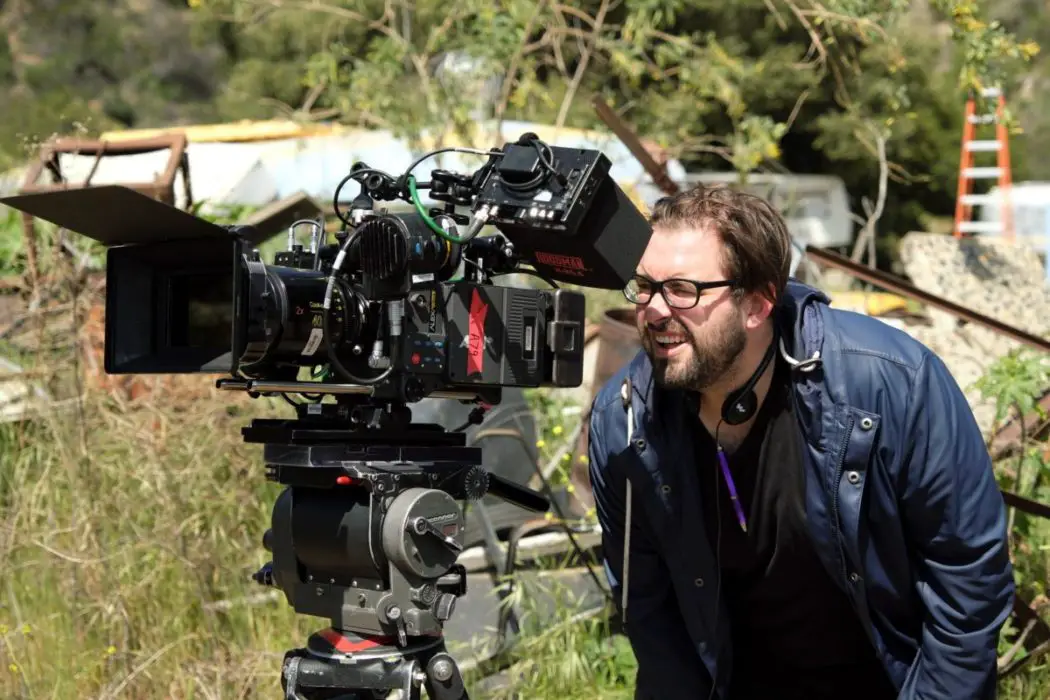
Jim Dixon retired from practicing law not a moment too…
Director Richard Bates, Jr. is beginning to look a specialist in the perennially popular horror/comedy genre. His previous outings Suburban Gothic and Trash Fire fit squarely into that category, as does his latest feature Tone-Deaf, which boasts an impressive, seasoned cast, including Robert Patrick, Amanda Crew, Kim Delaney, and Ray Wise.
After losing her job and imploding her latest dysfunctional relationship, Olive (Amanda Crew) flees the city for the weekend, escaping to the countryside for some peace and self-reflection. She rents an ornate country house from an eccentric widower named Harvey (Robert Patrick). Soon two generations collide with terrifying results as Olive awakens Harvey’s homicidal tendencies and is plunged into a blood-soaked fight for her life. More than your average slasher film, Tone-Deaf provides a dark critique of the bizarre cultural and political climate that currently exists.
Richard Bates, Jr. spoke exclusively with Film Inquiry about Tone-Deaf.
Jim Dixon for Film Inquiry: I watched Tone-Deaf this morning and I have to tell you honestly, I loved it.
Richard Bates, Jr.: Thank you so much, I appreciate it.
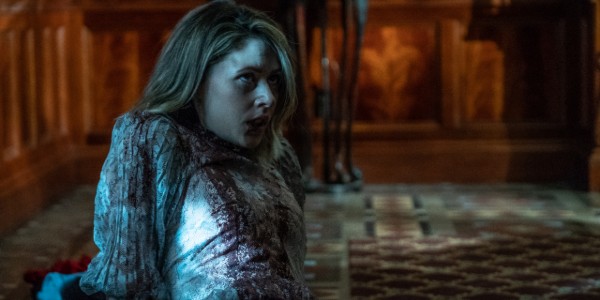
Smartphone-Era Psycho
It seemed to me sort of a Smartphone-era Psycho but with generation gap comedy overlaid. How did the idea come to you?
Richard Bates, Jr.: Well, you know, there’s so much content being made right now, right, but from sort of an inside perspective about meetings I take, you really have to work from like 5 or 6 formulas in order to sell something. And that’s even in the low-budget game. Oddly enough the low-budget game actually more so right now with the meetings I have taken.
So, the idea was I just started listening to music so much because there are no rules in music, you know, the art form has been around so much longer. No one cares if you’re sampling – there’s a rain stick in a rock ’n ’roll song or etc., etc. So the idea was to make a film like it was a song, sort of like a dance track sampling other genres. We’re creating a horror film but we’re sampling the three genres that we pulled from—coming of age, slasher horror and absurd comedy, and that was sort of inspired by all of the reaction after the election year—over the course of 24 hours it felt like I was living in ten different movies from the time I woke up till the time I went to bed. So, that was sort of the conceit for the film—to try to make a satire, to try to combine genres like that with sort of a satirical bent. And hopefully in a few years from now if someone were to watch it, it would exist in this sort of bizarre kind of cultural artifact.
It’s interesting that you made the analogy to music because you’ve got a very eclectic and varied music score—you must have been keeping your music editor pretty busy. How important is music to the overall movie?
Richard Bates, Jr.: Super important. You use music on a more typical film to sustain its tone, and with a movie like this you use music to aid in the tonal shift and the atmosphere. Also, the fun of music with a movie like this—sort of the age of subtlety and this comes from the idea of creating my own cultural artifact—was to capture this “in your face-ness” and then the death of subtlety in conversation and in most conversations I have, because of the internet and technology…there’s no need for subtlety right now. A lot of the musical shifts were inspired to sort of shock you out of one genre and into another, so it’s very important to the conceit of the movie.
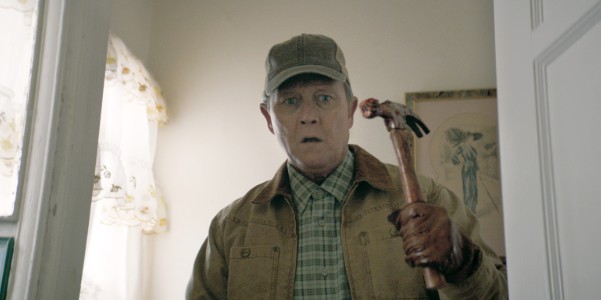
Directing Robert Patrick and Geeking Out Over The X-Files
You do have some hysterically funny and perceptive dialogue in the movie and of course you have an excellent cast. I don’t think there’s anybody in here who doesn’t have 50 or 60 credits. Let’s start with Robert Patrick because one, I’ve been a fan of his since Terminator 2, and second, he’s billed as an executive producer. How important was his contribution to the movie?
Richard Bates, Jr.: Oh my gosh, first of all I love him—X-Files is my favorite show of all time—Agent Doggett—a dream come true. So the first thing I did when I talked to him was to geek out about X-Files. But when it came to him it’s super important because he’s sort of political, right, and I’m certainly more liberal than him, and it was important to me to get someone to play Harvey who wouldn’t make fun of him. You know? Someone who would try to defend him. Sure, he’s a bad guy—the villain in the context of the film—but the whole point of the movie is that everyone is full of shit. That’s the common ground. We’re all full of shit. We’re all hypocrites. And the idea is that Harvey though, has stopped growing, he’s open to nothing now, and then you’ve got this character at the other end of the spectrum, Olive, who doesn’t know who she is, so she’s just open to everything, and to pit them against each other. In fact, Tone-Deaf ends with Olive beginning her life having finally become an active participant in it. She doesn’t even know she’s in a horror film until the third act.
Yes, although we keep waiting for something terrible to happen.
Richard Bates, Jr.: Right, we know. [laughs] But she doesn’t. And when she realizes that she becomes an active participant.
Directing Ray Wise and Geeking Out Over Twin Peaks
You also have Ray Wise in a small but pivotal role, which further upped the geek appeal for me. The X-Files and Twin Peaks are two of my favorite shows of all time.
Richard Bates, Jr.: Those are my two favorite shows of all time – hands down – my two favorite shows. This is my third movie with Ray. I love Ray. I wish it was my fourth. I tried to get him in Trash Fire, but he was shooting something for HBO. Ray is just a great guy and I feel like the way I write, no one gets it like Ray. Although, my favorite moments from this whole movie, they’re all from the actors. I mean Robert the way he delivered his monologues, everyone was so game. Robert added my favorite line to the whole movie, I didn’t even write it, but at the bar I would him give him different drinks to see how he would react to it and then I said, “Sneak Robert Patrick a Shirley Temple, I can guarantee you he’s never ordered a Shirley Temple before.” [laughs] And he said, “Don’t hold back on the cherries.” He was so game and so sharp: that was the first thing he said, and I thought it was perfect and it’s become my favorite line.
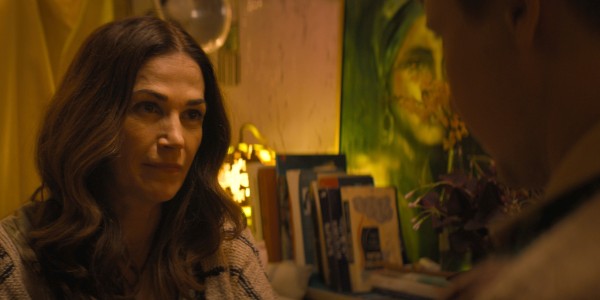
The combination of horror and humor in this works really, really well. Kim Delaney is a huge favorite of mine and please tell me she’s as wonderful as I would like to believe she is.
Richard Bates, Jr.: She is so kind and so game—she’s never played a character like this before, you know what I mean?
Not too many people have.
Midnight Movie Escapism
Richard Bates, Jr.: Right, so part of the idea was to touch upon things but also to create the sense of midnight movie escapism. So everyone is larger than life, you know what I mean, it is a heightened stylized reality. The good thing about the fact that this is my fourth movie is—my other movies are sort of out there—is no actress has ever been in one of my movies without having watched another one, so they’re pretty much game for anything. The people that are going to work with me are game to just give anything a shot, and we just had the best time. I liked everyone. I am bad enough at business that I would tell you the truth right now – I did not have a problem with a single actor on this movie. It was just fun.
That house looked vaguely familiar to me and I’m not sure if I may have seen it in a location in something else. Can you tell us where you filmed?
Richard Bates, Jr.: We actually filmed in Piru [California], and I wrote it into the script, which is sort of a very fascinating place. The history – the house had burned down – this house is sort of an historical space and they rebuilt it to its exact specifications. The person that built it had sort of tried to create his own garden of Eden in this town and it didn’t work out. He ended up selling a lot of the land to an oil company but there’s this very fascinating atmosphere in the house, and the town in general, that I thought was really cool for this movie and sort of would seep into the actors.
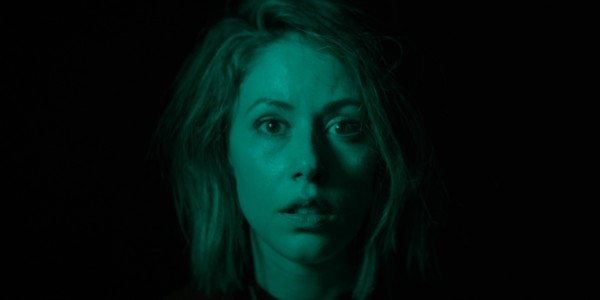
Next Up: A Pagan Comedy
What’s next for you?
Richard Bates, Jr.: Actually I’m shooting a new movie in less than a month. I wrote this movie that no one would finance, this pagan comedy, and at a certain point I handed it to my friend Matthew Gray Gubler, this actor from Criminal Minds, and he was like, “Dude this is great, f*ck it, let’s just do it.” So, we are self-financing this movie. Sort of not letting anyone stop us. Trying to not be the film maker who had a dream project but no one will pay me enough to make it so I can’t get it made, you know, we’re just purely making it for the love of making movies.
Film Inquiry thanks Richard Bates Jr. for taking the time to speak with us.
Released by Saban Films, Tone-Deaf is now playing in theaters and On Demand.
Does content like this matter to you?
Become a Member and support film journalism. Unlock access to all of Film Inquiry`s great articles. Join a community of like-minded readers who are passionate about cinema - get access to our private members Network, give back to independent filmmakers, and more.
Jim Dixon retired from practicing law not a moment too soon, and now works as a freelance writer and film critic. A lifelong and unrepentant movie geek, he firmly believes that everything you need to know in life you can learn at the movies. He lives in upstate New York.













